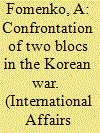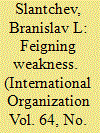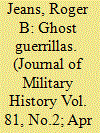| Srl | Item |
| 1 |
ID:
123909


|
|
|
|
|
| Publication |
2013.
|
| Summary/Abstract |
IN THE LATTER HALF of the 1940s, due to Japan's defeat in World War the political landscape in the Far East significantly changed the balance of forces seeking political domination in this part of the world.
Leaders of all democratic victor nations, simultaneously but for different reasons, shifted their support from Chiang Kai-shek and his government of "reactionary" Nationalists to "progressive" Chinese Communists.
|
|
|
|
|
|
|
|
|
|
|
|
|
|
|
|
| 2 |
ID:
097718


|
|
|
|
|
| Publication |
2010.
|
| Summary/Abstract |
In typical crisis bargaining models, strong actors must convince the opponent that they are not bluffing and the only way to do so is through costly signaling. However, in a war, strong actors can benefit from tactical surprise when their opponent mistakenly believes that they are weak. This creates contradictory incentives during the pre-war crisis: actors want to persuade the opponent of their strength to gain a better deal but, should war break out, they would rather have the opponent believe they are weak. I present an ultimatum crisis bargaining model that incorporates this dilemma and show that a strong actor may feign weakness during the bargaining phase. This implies that (1) absence of a costly signal is not an unambiguous revelation of weakness, (2) the problem of uncertainty is worse because the only actor with incentives to overcome it may be unwilling to do so, and (3) because of the difficulty with concealing resolve, democracies might be seriously disadvantaged in a crisis.
|
|
|
|
|
|
|
|
|
|
|
|
|
|
|
|
| 3 |
ID:
153766


|
|
|
|
|
| Summary/Abstract |
After a protracted struggle, in 1949 the Chinese Communists defeated Chiang Kai-shek’s Nationalist armies and took control of the mainland. After the possibility of recognition of the new regime was dashed by Communist mistreatment of American diplomats and other U.S. citizens, the U.S. government adopted a strong anticommunist position. Disgusted with Chiang and his Chinese Nationalist Party, it also turned its back on its wartime ally. Thus opposed to both Communists and Nationalists even before the final Communist victory, it launched a search for viable “third forces” (neither Communist nor Nationalist) it could support instead. Far from an “abstraction,” this quest constituted a powerful theme in the approaches of the Central Intelligence Agency (CIA) and State Department to China during the early 1950s.
|
|
|
|
|
|
|
|
|
|
|
|
|
|
|
|